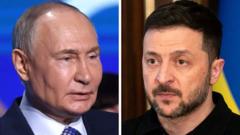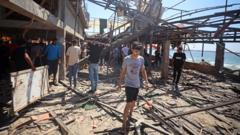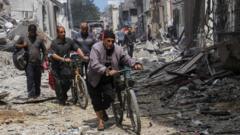In a notable shift, President Vladimir Putin indicated a willingness to initiate direct discussions with Ukrainian President Volodymyr Zelensky in a recent interview on Russian state television. His comments, articulated on Monday, marked the first openness to dialogue since the conflict escalated in February 2022. Putin described Russia's stance on peace initiatives as positive, expressing hope that Ukraine would reciprocate. Notably, despite the diplomatic overture, military operations against various Ukrainian cities continued unabated, demonstrating a contrasting stance between talk and action.
Putin Signals Openness to Dialogue with Ukraine Amid Ongoing Attacks

Putin Signals Openness to Dialogue with Ukraine Amid Ongoing Attacks
Russian President Vladimir Putin expresses willingness to engage in peace talks with Ukraine, even as military strikes persist across the nation.
Kremlin spokesman Dmitry Peskov clarified that Putin's remarks suggested a potential for negotiations specifically addressing the avoidance of civilian target strikes. However, Russian airstrikes continued on Tuesday, with significant attacks reported in Zaporizhzhia and Kharkiv, resulting in civilian casualties. President Zelensky condemned the strikes as "deliberate Russian terror" and argued that a clear response from the Kremlin was essential to determine whether peace was genuinely a priority for Russia.
The recent escalations included a deadly strike on an apartment block in Zaporizhzhia, which killed one woman and injured several others, including children. In response to these developments, Zelensky reiterated a proposal for a 30-day ceasefire pertaining to attacks on civilian infrastructure, suggesting that refusal by Russia would indicate a continued desire for warfare rather than peace. Furthermore, during the week following Easter, discussions were planned regarding an unconditional ceasefire with US and European allies.
While Putin acknowledged instances of military strikes on civilian locations, the Kremlin's approach to peace remains ambiguous, with some analysts dubbing recent unilateral truces as tactical maneuvers rather than genuine efforts towards lasting peace. The complexities of this conflict continue to unfold as both sides grapple with longstanding animosities and the need for dialogue amidst ongoing violence.
As the diplomatic landscape evolves, the international community watches closely for signs of genuine progress or continued discord in one of Europe's most protracted conflicts.
The recent escalations included a deadly strike on an apartment block in Zaporizhzhia, which killed one woman and injured several others, including children. In response to these developments, Zelensky reiterated a proposal for a 30-day ceasefire pertaining to attacks on civilian infrastructure, suggesting that refusal by Russia would indicate a continued desire for warfare rather than peace. Furthermore, during the week following Easter, discussions were planned regarding an unconditional ceasefire with US and European allies.
While Putin acknowledged instances of military strikes on civilian locations, the Kremlin's approach to peace remains ambiguous, with some analysts dubbing recent unilateral truces as tactical maneuvers rather than genuine efforts towards lasting peace. The complexities of this conflict continue to unfold as both sides grapple with longstanding animosities and the need for dialogue amidst ongoing violence.
As the diplomatic landscape evolves, the international community watches closely for signs of genuine progress or continued discord in one of Europe's most protracted conflicts.




















